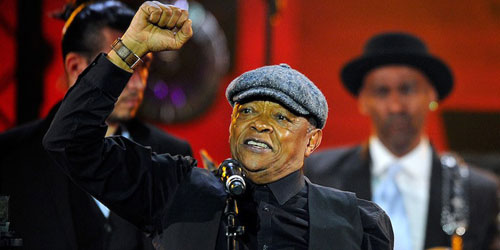|
People around the world paid tribute to legendary South African trumpeter Hugh Masekela who passed away January 23, 2018.
In the 1980s I was asked to cover South African artists who were performing in New York City by Ramsay Milne, editor of the South African newspaper, The Argus. I interviewed actor Zakes Mokae who won a Tony Award for his performance on Broadway in Athol Fugard’s “Master Harold” as well as Thuli Dumakude, who starred in “Poppie Nongena” and founded the Izulu African dance company. When I submitted the article below to the Argus in 1984, it was rejected because of Masekela’s controversial anti-Apartheid activism. All these artists wanted to raise awareness of the plight of their people and expressed their love of the homeland.
White minority Apartheid rule in South Africa began in 1948 and ended in 1994. The system’s institutionalized oppression of the Black majority kept them segregated in black townships, denied them legal and political rights, made intermarriage illegal and subjected them to economic and social exploitation. The historic Sharpeville Massacre in 1960 in which 69 protestors were killed sparked international condemnation that eventually led to sanctions and pressure that in 1994 threatened to undermine the country. The opposition party, the African National Congress (ANC), was led by Nelson Mandela who was jailed for 27 years. When he was freed in 1990, he negotiated with the de Klerk government to return the country to majority rule and end Apartheid.
Hugh Masekela came back to South Africa after Mandela’s release whose freedom he foresaw in his anthem “Bring Him Back Home“ in 1986. After long personal struggles, Masekela said, “You can live away from home, but it doesn’t change the essence, the fabric of what you are.”

“HUGH MASEKELA BLASTS OFF AT S.O.B.”
DATELINE: NEW YORK CITY - Thursday August 31, 1984
“Everybody out here loves a winner,
Don’t go lose it baby!”
Lyrics from disco single
“Don’t Go Lose it Baby” on album Techno Bush”
The last night of a three-night gig, famed trumpeter Hugh Masekela and his African band jammed for a sold-out house that clapped and swayed to their rhythms at S.O.B. (Sounds of Brazil on 203 Varick Street), New York City’s hottest in spot for Latin-Afro music fans.
In America from Africa for the first time, the twelve member band’s vibrant music, a blend of big-band sounds, bop-jazz lines licked out by Masekela and outstanding saxophonist Barney Rachabane with harmonious vocals sung by three women was backed up by mbagana rhythms on guitar, percussion and giant synthesizer. The set, which included a variety of styles from a Zulu ballad on Africa’s drought “Stimela”, a mournful song about workers on coal trains, the disco single “Don’t Go Lose it Baby”, to the humorous “Matilda” ended with a standing ovation. Masekela said, “I would like to dedicate this evening to the musicians of Africa.”
Out of principle, Masekela has been in self-imposed exile from his native land for over twenty years. He initially left South Africa during the racial tensions of the repression of 1961 for London and later America. This was the time of the Vietnam War, civil rights struggle and emerging black power movement. Masekela said, “I think I used this time for leverage as far as screaming about South Africa. My first really angry song was “Coincidence” on a live album in 1967. I just got mad and philosophical and idealistic around that time.”
While living outside his native land, he always felt a strong commitment to its musical culture and wealth of untapped talent. His career shifted away from success in the late 1960’s after his album “Grazin in the Grass” was on the top 10. At this time, he mixed political ideals with musical affiliation with Harry Belafonte, Miriam Makeba and Dizzy Gillespie. After other albums and collaboration with Herb Albert, he was unable to find a strong identity in American black music and returned to Africa to explore its roots in Zaire, Ghana and Nigeria where he recorded “Home” and “Working for a Dollar Bill” with percussionist Hedzolleh Soundz. His comeback album, “Techno-Bush”, produced by Stewart Levine on Jive Africa-Arista label, was recorded earlier this year in a mobile recording studio outside the Woodpecker Inn in Gaborne, Botswana near the
South African border where he now lives. “For me,” Masekela said, “the album is the first opportunity to hear the music the way I’ve always wanted to hear it.” Along with other African musicians and the Soul Brothers, he created a unique experience by combining the high-tech sounds of the Fairlight Cm1 computer and electric organ with African drums, marimbas, thumb piano and female chorus. Conceived as an album of South Africa’s greatest hits, the music mixes calypso, New York Break and gospel styles with indigenous African rhythms to create a sensuous sound that is at once contemporary pop, yet reminiscent of the fiesta spirit of tribal celebration.
Currently on international tour and headed for Canada, Masekela and his band are being filmed by London crews for a two-hour documentary for British television. At S.O.B., director Peter Watson-Wood said, “All of Masekela’s performances have been a great success. He is a man with guts, humor and a mission to bring South Africa’s music to the world.”
|